A Guide to Moroccan shopping: souvenirs, markets, and bargaining tips
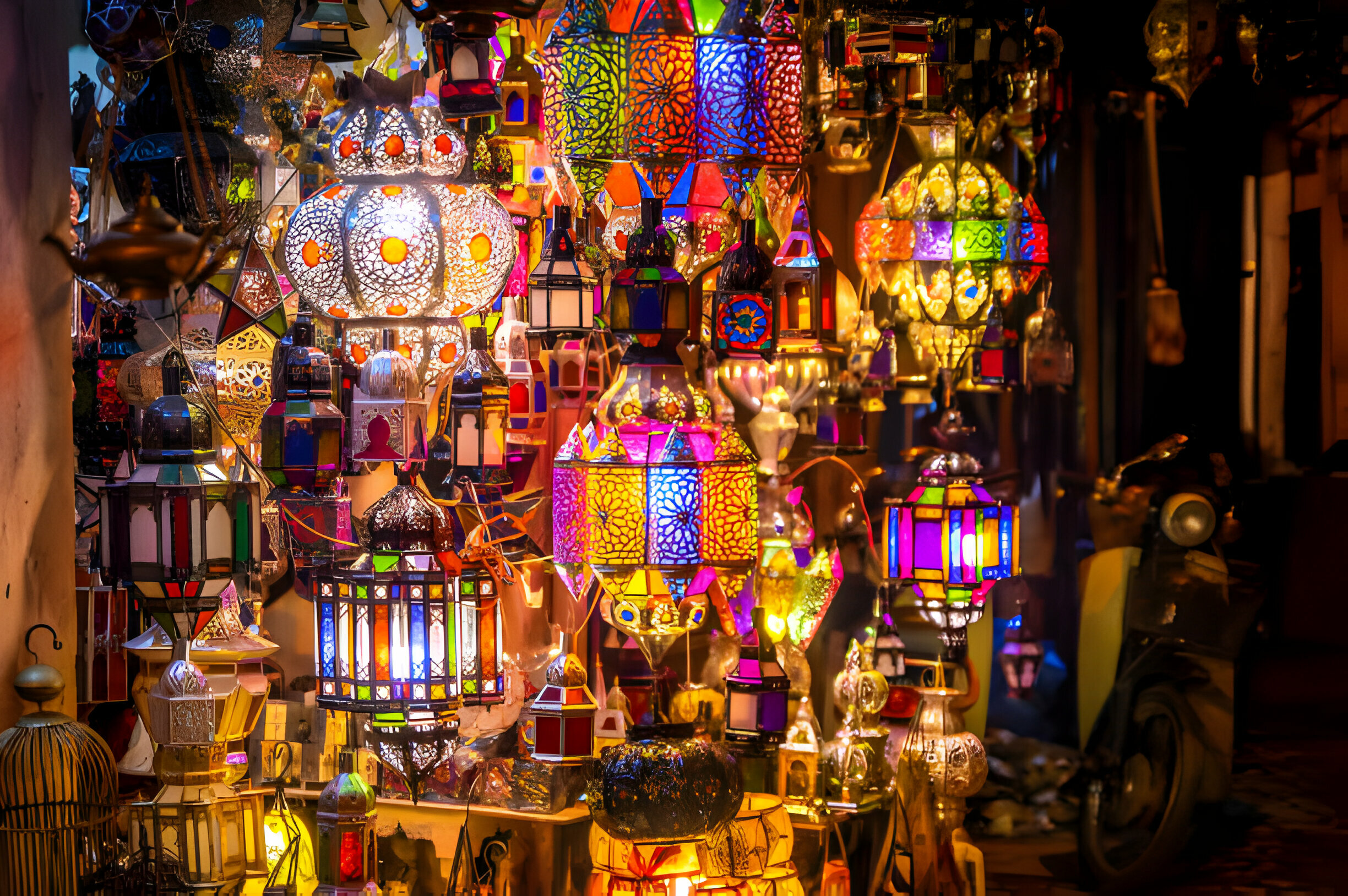
A Guide to Moroccan shopping: souvenirs, markets, and bargaining tips
Introduction
Shopping in Morocco isn’t just a transaction; it’s an immersive cultural experience that takes you through bustling markets, offering unique souvenirs and a chance to embrace the art of bargaining. From vibrant souks to artisanal shops, here’s your ultimate guide to navigating Moroccan shopping, exploring coveted souvenirs, navigating markets, and mastering the art of bargaining.
Exploring Moroccan souvenirs
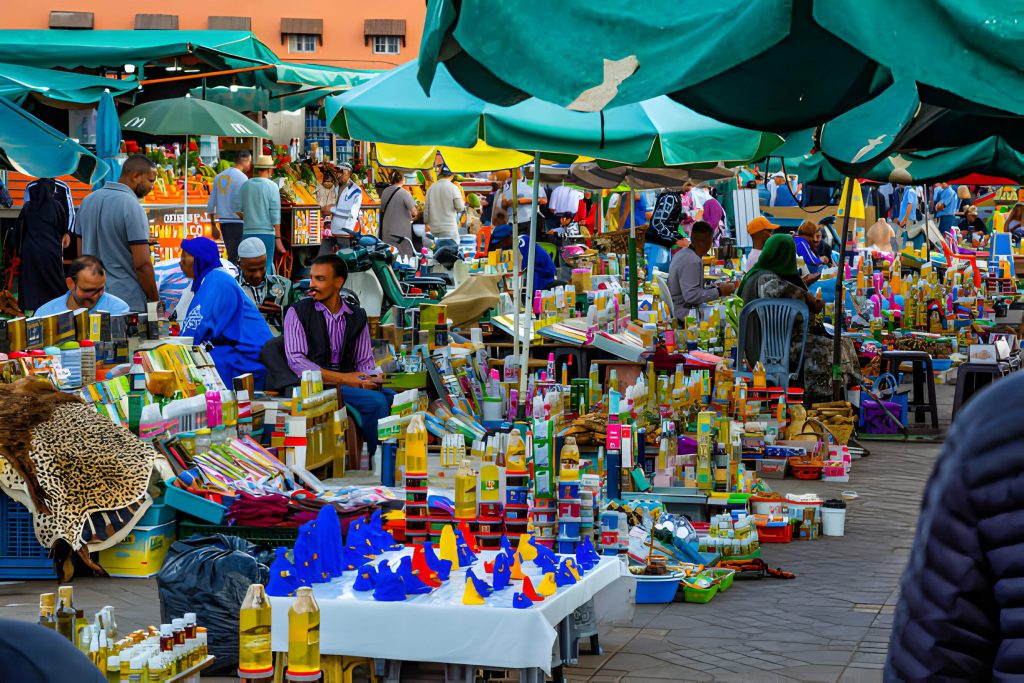
Moroccan souvenirs encapsulate the nation’s cultural tapestry, showcasing a wealth of heritage and artisanal prowess. Explore a myriad of treasures, from meticulously woven carpets that narrate tales of tradition to dazzling ceramics reflecting vibrant aesthetics. The craftsmanship extends to exquisite leather goods, each piece embodying a unique narrative. Immerse yourself in the kaleidoscope of Moroccan artistry and history, as these souvenirs not only serve as mementos but also as gateways to the rich cultural heritage of the enchanting North African nation.
Carpets and rugs
Moroccan carpets, celebrated for their rich heritage, boast vibrant hues and elaborate patterns. Delve into the world of these exquisite rugs, discovering the luxurious texture of the plush Beni Ourain or the captivating geometric designs of Azilal carpets. Each piece reflects the cultural tapestry of Morocco, where traditional craftsmanship intertwines with artistic expression. With a kaleidoscope of colors and meticulous detailing, these carpets not only enhance interiors but also tell a story of centuries-old craftsmanship, making them a cherished and timeless addition to any space.
Leather goods
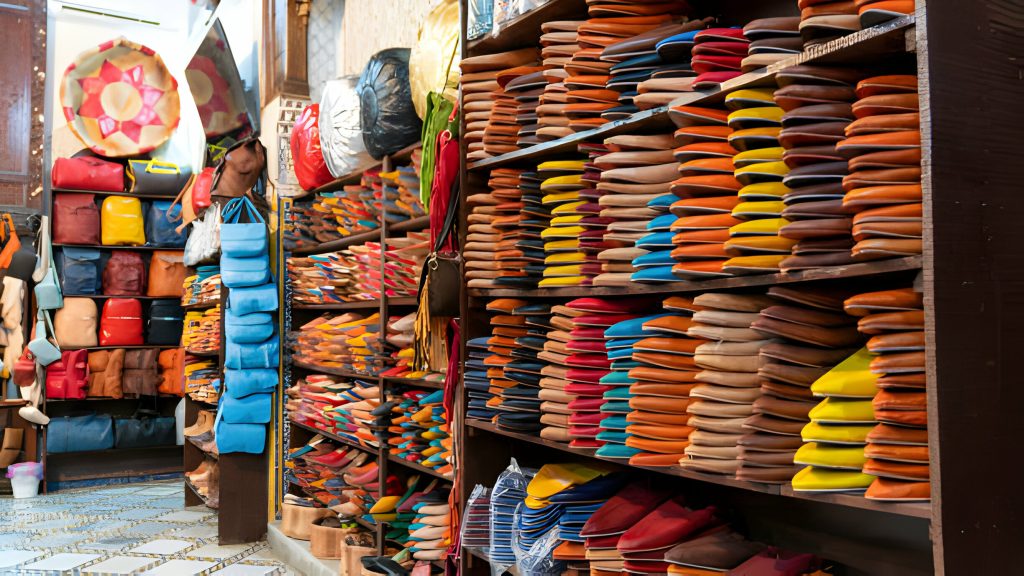
Fes and Marrakech, two renowned Moroccan cities, have gained global acclaim for their exquisite leather products. Delve into the heart of these vibrant locales to discover a rich tradition of craftsmanship. Wander through bustling tanneries and workshops where skilled artisans meticulously create handcrafted bags and intricately designed slippers. Immerse yourself in the sights and sounds as you witness the age-old techniques passed down through generations, adding a deeper appreciation to the unique allure of these cities and their unparalleled leather goods.
Pottery and ceramics
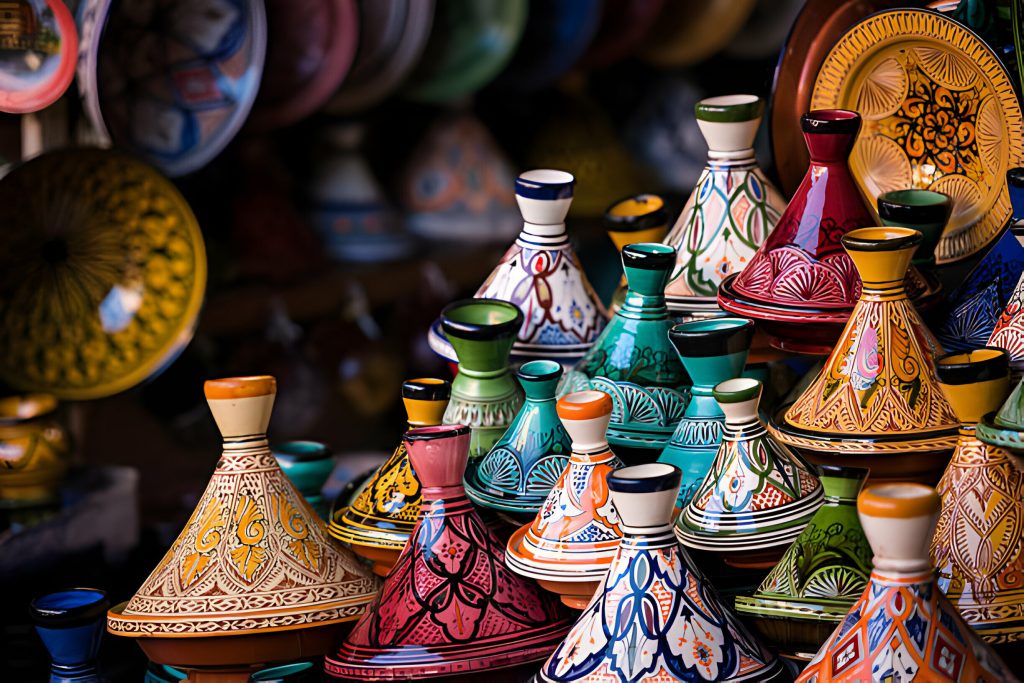
Discover the exquisite artistry of Safi, Fes, and Marrakech pottery, where masterful craftsmanship transforms tagines, plates, and decorative pieces into captivating works of art. The skilled artisans in these Moroccan cities intricately adorn their creations with mesmerizing patterns, showcasing the rich cultural heritage and artistic flair of the region. Immerse yourself in the vibrant colors and traditional techniques that breathe life into each piece, making the pottery of Safi, Fes, and Marrakech a testament to the centuries-old tradition of Moroccan ceramic craftsmanship.
Metalwork and lanterns
Skilled metal artisans meticulously create stunning lanterns and trays, employing time-honored techniques that reflect a rich tradition. The intricacy of their craftsmanship lends an unparalleled charm to these decorative pieces, transforming any living space with an exotic allure. Each carefully fashioned item serves as a testament to the mastery of these artisans, showcasing a harmonious blend of tradition and artistic innovation that elevates the ambiance of any home.
Navigating Moroccan markets
Medina markets
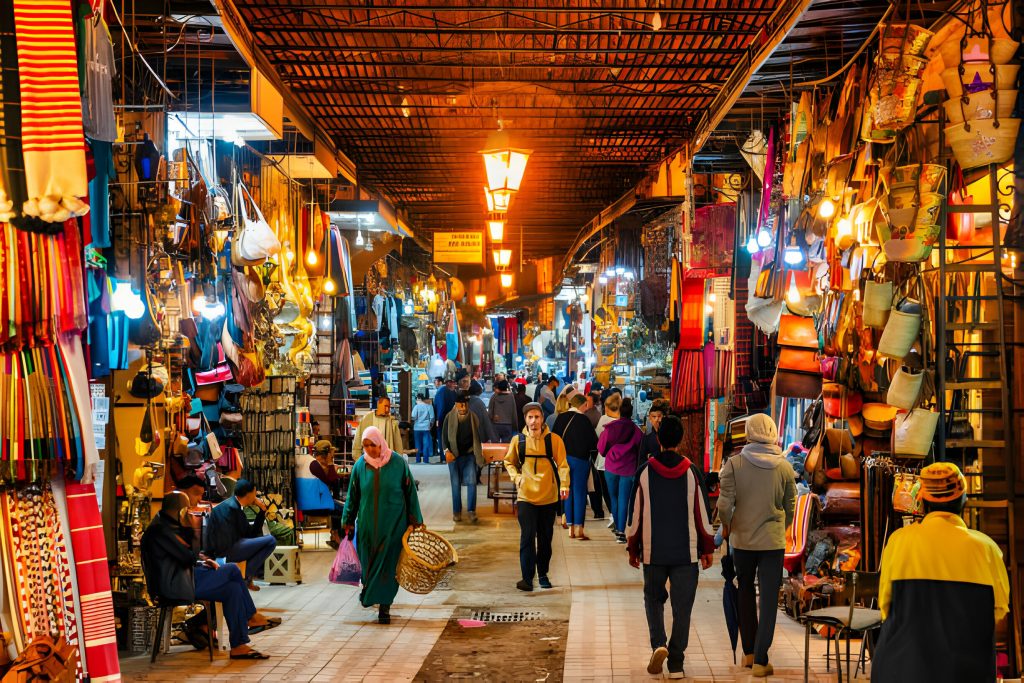
At the vibrant core of Moroccan retail therapy are the enchanting medinas, bustling marketplaces that encapsulate the essence of local commerce. In Marrakech, the iconic Jemaa el-Fnaa stands as a bustling spectacle, its labyrinthine alleys teeming with an array of captivating stalls, where everything from intricate handicrafts to aromatic spices beckon exploration. Meanwhile, in Fes, the Bab Boujloud invites visitors to navigate through a mesmerizing maze of vendors, each showcasing a rich tapestry of Moroccan culture through their wares. These medinas pulsate with the vibrant energy of trade, offering an immersive and sensory shopping experience.
Haggling and bargaining
In the vibrant tapestry of Moroccan markets, bargaining is elevated to an art form. Mastering this social dance involves approaching negotiations with a warm smile, fostering friendly banter, and initiating the delicate process by proposing a price at half the initial offer. The key lies in the gradual ascent from this starting point, creating a harmonious exchange where both parties contribute to the choreography of commerce in a lively and culturally rich atmosphere.
Etiquette and respect
It is crucial to honor and embrace local customs while traveling. Always request permission before capturing photographs, respecting the privacy and cultural sensitivities of the community. In situations of uncertainty, consult with locals or shop proprietors for guidance, fostering a deeper understanding of the destination’s traditions. This not only demonstrates cultural respect but also enhances the overall travel experience by creating positive interactions with the local community.
Exploring off-the-beaten-path souks
Explore the lesser-known treasures of Morocco by venturing beyond bustling main markets. Delve into the enchanting souks tucked away in smaller towns such as Essaouira and Chefchaouen, where an authentic and off-the-beaten-path shopping experience awaits. These hidden gems promise unique discoveries, providing a refreshing escape from the typical tourist destinations and allowing you to immerse yourself in the rich local culture. Unearth handcrafted wonders, vibrant textiles, and cultural artifacts while enjoying a more intimate connection with the heart and soul of Morocco’s diverse market scene.
Mastering the art of bargaining
Start low and stay polite
Initiate negotiations by proposing a starting point significantly below the requested amount, employing a tactful and amiable approach. This involves skillfully navigating the conversation with a balance of assertiveness and diplomacy. By doing so, one aims to create a cooperative atmosphere conducive to reaching a mutually beneficial agreement, all the while demonstrating respect and friendliness throughout the negotiation process. This method allows for the exploration of potential concessions and compromises, fostering a positive interaction that enhances the likelihood of reaching a favorable outcome for all parties involved.
Be willing to walk away
Feel empowered to confidently step back from a transaction if the offered price falls short of your expectations. Embracing this assertiveness can compel the seller to reconsider and potentially present a more favorable deal. Remember, negotiating with conviction is an essential skill that not only safeguards your financial interests but also encourages fair and beneficial exchanges.
Know when to stop
Establish a clear budgetary limit before entering negotiations and steadfastly adhere to it. Clearly communicate your maximum acceptable price to the seller, maintaining a polite and appreciative tone throughout the conversation. If an agreement cannot be reached, gracefully express gratitude for their time and consideration, then proceed to explore other options. This disciplined approach ensures financial prudence and fosters effective decision-making in the pursuit of a favorable transaction.
Enjoy the experience
Bargaining is not merely a transaction; it’s a rich cultural ritual woven with stories and interactions. Embracing this process goes beyond securing a deal – it’s about savoring the intricate dance of negotiation, relishing the unique tales that accompany each purchase. Dive into the art of bargaining, where every haggle is a chapter in a cultural narrative, and every exchange is a celebration of tradition and human connection. So, savor the experience, delight in the stories, and appreciate the tapestry of cultural richness that unfolds with every successful negotiation.
Conclusion
Moroccan shopping is an adventure that goes beyond acquiring goods; it’s about connecting with the vibrant culture and traditions of this enchanting country. With these tips in hand, embark on your shopping journey through Morocco’s lively markets, and revel in the art of bargaining to bring home cherished souvenirs and unforgettable memories.
FAQs
- Are credit cards widely accepted in Moroccan markets?
- While some larger stores and restaurants accept cards, it’s advisable to carry cash for most market purchases.
- Is it customary to tip when bargaining in Morocco?
- Tipping isn’t expected during bargaining. However, if you appreciate the service, a small tip is always welcomed.
- What’s the best time of day to visit Moroccan markets?
- Early mornings or late afternoons are ideal for a less crowded shopping experience.
- How do I ensure the authenticity of the souvenirs I purchase?
- Shop from reputable stores or seek recommendations from locals to ensure the authenticity of your purchases.
- Can I try on items before purchasing in Moroccan markets?
- In most cases, shop owners allow customers to try on clothing and accessories before making a purchase.
All Categories
- Actividades en Marruecos
- Adventure
- Aventura
- blog
- blog
- Camping salvaje
- City Tours
- country tours
- Desert tours
- Estilo de vida
- Excursiones de un día a Marrakech
- Life Style
- Marrakech Day Trips
- Morocco activities
- Morocoo
- Rutas por el desierto
- Sin categorizar
- viajes por el país
- Visitas por la ciudad
- Wild Camping


